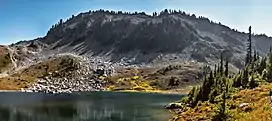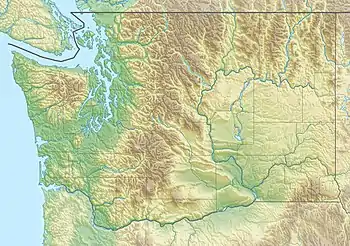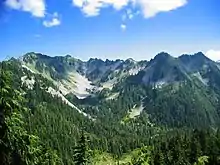| Bogachiel Peak | |
|---|---|
 Bogachiel Peak, northwest aspect | |
| Highest point | |
| Elevation | 5,478 ft (1,670 m) NAVD 88[1] |
| Prominence | 524 ft (160 m)[1] |
| Coordinates | 47°54′19″N 123°46′39″W / 47.9053649°N 123.7774169°W[2] |
| Geography | |
 Bogachiel Peak Location in Washington state  Bogachiel Peak Bogachiel Peak (the United States) | |
| Location | Clallam County, Washington, U.S. |
| Parent range | Olympic Mountains |
| Topo map | USGS Bogachiel Peak |
| Geology | |
| Age of rock | Eocene |
| Climbing | |
| Easiest route | Hiking Trail |
Bogachiel Peak is a 5,478-foot (1,670 m) peak in the Olympic Mountains of Washington, U.S.. It is located in Olympic National Park, and is a high point on the High Divide separating the Hoh River and Sol Duc River valleys, and forming the southern rim of Seven Lakes Basin. The peak is situated at the headwaters of the Bogachiel River. The name "Bogachiel" is a corruption of the Quileute words bo qwa tcheel el, or /boqʷač'íʔl/, from /bó:q'ʷa/, "muddy", and /číʔlowa/, "water", meaning "gets riley [turbid] after a rain", "muddy waters", or, less likely, "big river".[3]
Climate

Based on the Köppen climate classification, Bogachiel Peak is located in the marine west coast climate zone of western North America.[4] Most weather fronts originate in the Pacific Ocean, and travel northeast toward the Olympic Mountains. As fronts approach, they are forced upward by the peaks of the Olympic Range, causing them to drop their moisture in the form of rain or snowfall (Orographic lift). As a result, the Olympics experience high precipitation, especially during the winter months. During winter months, weather is usually cloudy, but, due to high pressure systems over the Pacific Ocean that intensify during summer months, there is often little or no cloud cover during the summer. Precipitation runoff from the mountain drains into Bogachiel River, Sol Duc River, and the Hoh River.
See also
References
- 1 2 "Bogachiel Peak, Washington". Peakbagger.com.
- ↑ "Bogachiel Peak". Geographic Names Information System. United States Geological Survey, United States Department of the Interior.
- ↑ Parratt, Smitty (1984). Gods & goblins: A Field Guide to Place Names of Olympic National Park. CP Publications. p. 13. ISBN 0-914195-00-X.
- ↑ Peel, M. C.; Finlayson, B. L. & McMahon, T. A. (2007). "Updated world map of the Köppen−Geiger climate classification". Hydrol. Earth Syst. Sci. 11: 1633–1644. ISSN 1027-5606.
External links
- "Olympic National Park". National Park Service.